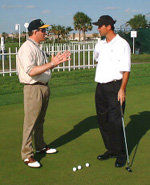
Overcoming a Bad Golf Shot
What is your typical reaction to bad shots? How frustrated do you get after you hit a shot out of play or miss a three-footer?
Are you able to recover quickly or does the frustration linger or build up throughout a round with every miss?
Following a bad shot, some golfers respond by replaying the images in their heads over and over… or by ruminating over what happened… or by verbally beating themselves up, which can lead to club banging or other overt signs of frustration.
Here’s the problem: when you can’t move past a bad shot or when you respond with frustration, a mental wrestling match starts in your head and the odds are not in your favor.
This mental battle includes a competition for your focus. On one side of the focus battle is your strategy for the current shot (choosing your club, eyeing up your shot, where are you looking to place the ball, etc.)
The other side competing for your focus is quite the powerhouse of intense emotions, demoralizing images and negative thoughts about the bad shot.
The winner of this internal battle, or your mental response to your circumstances, will profoundly impact your play on the course.
When it comes to this internal battle for focus, you get to choose who wins out.
You choose your response to every shot and putt!
You can choose to focus on the current shot or you can focus on all the distractions from that bad shot that has already happened.
No matter how much energy and focus you place in the shot that has already happened, there is nothing you can do to change the past outcome.
Conversely, if you focus on what you can do in the moment, better results are more likely to happen.
If you want to raise the level of your golf game, you will need to learn an effective method to mentally rebound after a bad shot.
At the 2019 Arnold Palmer Invitational, Tyrrell Hatton had to decide how he was going to respond after a bad shot on the ninth fairway in the second round of the tournament. Hatton landed his approach shot between two bunkers, almost 30 yards off target.
After the bad shot, Hatton had an interesting exchange with his caddie:
HATTON: “Have you seen a worse golf shot? (pause) No, answer the question.”
CADDIE: “No.”
HATTON: “That was terrible.”
These are often the conversations golfers have internally with themselves all the time. After you hit a shot, there will always be some type of thought and emotional response, whether the shot is good or bad. After all, you are not a robot.
While Hatton’s comments may seem a bit self-critical, he remained incredibly composed in the moments right after the shot. In fact, Hatton managed to save par and played even better in the third round shooting a 6-under 66 with 7 birdies.
The key to rebounding after a bad shot is to respond with a healthy response, that is, to let go and deal with the next shot.
How to React Better to Bad Shots:
There is no magic when it comes to your mental game. If you want to respond with composure, you’ll want to rehearse a new response.
Visualization is a great way to start changing your reaction to a more effective positive response.
Let’s Use Missing A Short Putt:
(1) Get comfortable and close your eyes. Review a recent missed putt that caused an intense negative reaction.
(2) Visualize or imagine yourself getting upset with missing. How did you feel?
(3) Imagine taking a few deep breaths to calm down physically.
(4) Integrate breathing with with a calming thought about the miss, such as “I’m not perfect, even the best putter miss short putts. Let it go.”
(5) Imagine yourself refocusing on the next shot. Feel a sense of calm and confidence as you go through routine on the next tee box.
You can use visualization or mental imagery to practice any mental skill. In this case, you are anticipating bad shots that might anger you, and practicing a new way of reacting to the bad shot.
Related Golf Psychology Articles
- Remaining Calm After a Bad Golf Shot
- Staying Calm After a Bad Golf Shot
- Helping Young Golfers Cope With Bad Shots
- Subscribe to The Golf Psychology Podcast on iTunes
- Subscribe to The Golf Psychology Podcast on Spotify
Golf Mental Coaching Programs

All golf psychology programs include the Golfer’s Mental Aptitude Assessment (GMAP), a custom Mental Game Plan, weekly coaching sessions, unlimited email correspondence, and The Golfer’s Mental Edge 2.0 workbook program.
One-on-one mental coaching is the fastest and most effective method to improve your mental game, boost your performance, and make lasting changes!
We have unique mental coaching programs, customized for you. Please contact us with any questions your have about our programs. Provide your name, email, and role below:
Or Call us today at 888-742-7225 | Mental Game Success Stories